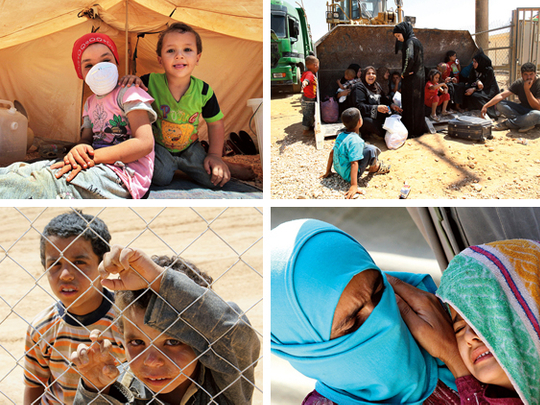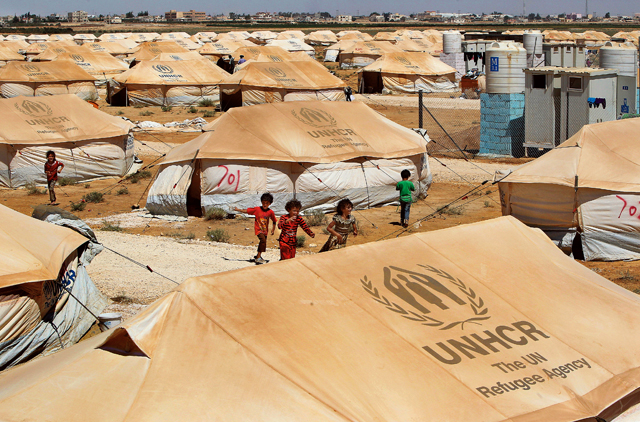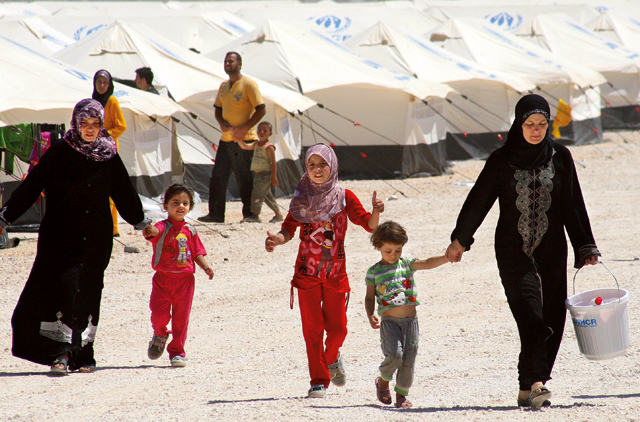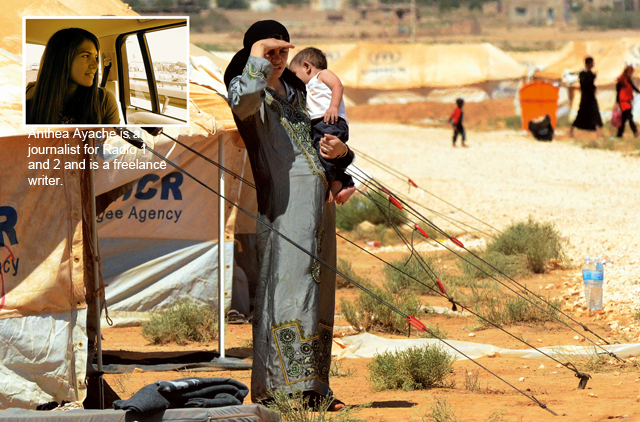
The Jordanian refugee camp that sits 6km south of the Syrian border is a wretched place, a combination of isolation, poverty and suffering. It’s a never-ending sea of pallid tents billowing in the infinite swirls of suffocating desert sand.
Its wire boundaries and heavily guarded gates exude a sense of imprisonment and within its walls refugees struggle with lost identity. In daylight hours they hover around a dirty mobile office thrusting small pieces of paper at weary-looking officials.
On these flimsy tickets a number is printed, rather like a raffle ticket. But here the
prize is sponsorship to live in Jordan, to regain independence, to rebuild dignity. But for many, this vast, treeless expanse will be home for the foreseeable future.
Many complain of poor hygiene standards and there are reports of desperate people using the shower areas as toilets. Most say they wish to return home but will be forced to stay in this barren expanse of nothingness.
On July 10 when Jordan flung open the gates of the Zaatari refugee camp, officials estimated a few hundred people a day would seek sanctuary within its confines. Less than two months later the desert camp, which was forced to function well before completion, shelters over 26,000 displaced people.
Fighting has intensified in neighbouring Syria and on a daily basis thousands of refugees are spilling over the country’s borders into neighbouring Turkey, Lebanon, Iraq and Jordan.
What many believed would be a mere trickle of refugees has developed into a flood. The UN estimates that 265,000 Syrians have now fled the 18-month-old conflict ravaging their homeland, and with the violence spiralling into sectarianism and no short-term end to the conflict in sight, the exodus shows no sign of abating.
Earlier this month, Jordan received 5,000 refugees in a 24-hour period prompting Prime Minister Fayez Tarawaneh to admit the growing influx was “becoming beyond our capabilities, beyond even our expectations and we expect more as things deteriorate in Syria”.
Nonetheless, despite the huge economic burden on an already struggling economy, the kingdom has vowed to maintain its open-border policy and the UN estimates that by the end of the year 80,000 people will call the Zaatari camp home. But ‘home’ is not a word that any refugee associates with the makeshift desert city.
The never-ending rows of identical United Nations High Commissioner for Refugees (UNHCR) tents under the searing sun do little to protect the thousands of displaced people from the relentless wind and choking sand swirls.
Here there is little comfort. For many, this vast uniform terrain with its harsh conditions is all people have left. Their choice has been whittled down to the rubble and slaughter in Syria or the destitution and misery of Zaatari.
Families who arrive overnight under the shelter of darkness to avoid being shot by Syrian armed forces find a 9km barbed wire enclosure of desperation and loss. At the gates, new arrivals mingle with those who, unable to cope with life as a refugee, prepare to leave.
Some wander down the beaten sand track turning south into Jordan, fortunate enough to have secured a sponsor. Others turn north, choosing instead a return to the violence of Syria. The reasons vary but many men say they brought their loved ones to the camp for their safety but, as men, must return to fight for The Free Syrian Army.
Others have to care for family members back in Syria, while some simply prefer to risk the violence rather than live in what they call ‘prison’. Speaking to those who stay behind, the sentiment is echoed around the camp.
“If it weren’t for my kids, I would never have come here,” says Amjad. “I am here to protect the children. Back home we would be eating at the table and they would start to bomb. We would grab the kids and run if we could get out of the house. On the street gunfire or shrapnel could hit us. We had to come here, but if I was on my own I wouldn’t stay.”
‘We came with nothing, we have nothing’
Many of Zaatari’s residents have fled from the southern city of Deraa, 100km south
of Damascus. Home to almost 100,000 people, it is where the uprising against President Bashar Al Assad first took roots in March 2011 after children were arrested and tortured for graffitiing anti-government slogans.
Fighting has been fierce in the city and as many as 40,000 residents have fled across the border with reports of summary executions, air strikes and continuous shelling by government forces.
One woman who fled the city after her home was destroyed said that she simply had no choice. “They were bombing us continuously and we got scared. I have 11 girls and four boys to look after. I fled with them through the night. We came with nothing, we have nothing left. Here the situation is really bad. We have no clothes, no money. We will leave if someone sponsors us to live outside this camp.”
Her story is not unique and her 15 children are not alone. Two-thirds of Zaatari residents are children, 5,000 of them below the age of four. Many children make the journey from Syria alone, saying their parents have either been killed or have had to stay behind. The UNHCR, The Jordan Hashemite Charity Organization and Unicef are all working hard to improve conditions for minors in the camp.
The milk of human kindness
A playground has recently been built by Mercy Corps where the alien sound of chatter and laughter can be heard within its rubber tyre periphery. Bahrain has recently pledged to build an educational complex for the camp, including four mobile schools to accommodate 4,000 students. For now, however, the children of Zaatari have little to do. They are everywhere, dirty, dishevelled and barefoot with no toys, no books, no television – all they have left are harrowing stories to tell.
One mother despairs for their well-being. “They wake up every night with bad
dreams. They are scared of so many noises. I don’t know how long this will take to go away. I want a normal life for them again. It’s not something they can get here, but at least they are safe.”
Improving the camp’s facilities for both children and adults is a top priority for the Jordanian government, but meeting the direct demands of the escalating crisis is crippling the country. The financial burden comes at a time when Jordan is already juggling a $2 billion (Dh7.34 billion) deficit and can ill afford $20 a day to support each refugee.
Unemployment in the country is at an all-time high, water is scarce and even the richest neighbourhoods have to rely on generators for power. Jordan has continuously appealed to the international community for humanitarian assistance for the camp, and recently the Planning and International Cooperation Minister Jafar Hassan told a press conference much more was needed. “The cost for Jordan to continue to welcome our Syrian brothers... is almost $700 million,” he says. That figure does little to make the US pledge of $21 million appear more than a mere drop in the ocean.
Gulf countries have rallied together. The UAE has set up a 500-bed field hospital and is funding the construction of a second refugee camp. Qatar and Saudi Arabia are providing caravans and prefab housing to replace the tents that currently cover the camp. For now, however, the conditions remain bleak. There are no fans, no natural shade and no refrigeration. There is only heat, dust and humidity.
Women can be seen in surgical masks, hanging what little laundry they possess in vain; within moments wet clothes are smattered with sand. And such is the case all over Zaatari; everyone carries a light film of sand in their hair, their eyebrows, under their nails, on their clothes.
Mohammad Abu Asaker, regional public information communications officer for UNHCR says, “The environment in Zaatari is the most difficult for the refugees because of the dust. We are doing our best to minimise this challenge by laying gravel in many parts of the camp.”
Harsh weather, harsh reality
Soon the season will change in Jordan and the Syrian refugees will be exposed to freezing lows and cruel winds. Providing families with durable accommodation to shelter them from daily sandstorms will become a necessity.
The UNHCR and its partners say they are speeding up work to overcome a multitude of challenges in the camp including power and water shortages – two essential but highly scarce resources in Jordan. Unicef and Mercy Corps are building two wells on site to increase water supply to the camp and ease the pressure on the surrounding local community.
Jordan was recently ranked third among 18 countries for having a “extreme water-security risk” and is hard pressed to provide this staple to the thousands entering the country.
Bottled water is currently brought into the camp via trucks, which heave their
goods up and down the road precariously close to scampering children. Meanwhile 13 incidences of sabotage of an Egyptian natural gas pipeline over the last year have seriously damaged the country’s power output, forcing the government to buy crude on the open market. The serious repercussions are evident all over the country and are also being felt in the camp.
One grandmother complained about the lack of light. “We desperately need lamps
for night. We are sleeping in complete darkness, it scares the children.” However, the UNHCR says 40 per cent of Zaatari is now supplied with electricity, which should ease a primary concern of many, charging mobile phones to contact loved ones back home. It would be fair to say that Zaatari is a tragic solution for Syrian refugees but the camp offers what Syria currently does not, a safe environment, free from war.
Those seeking its shelter are provided with basic services such as drinking water,
food and medical assistance, but it is still a far cry from internationally accepted standards. International donations have doubled in recent weeks, but the needs of those on the ground are growing at a faster rate.
Jordan desperately requires additional international assistance if it is to even begin to better the lives of those seeking safe haven within its boundaries. The international community can no longer shy away from its moral obligations to assist, and the humanitarian crisis unfolding along Syria’s borders can no longer be put on the back burner of the world’s attention.
Anthea Ayache is a journalist for Radio 1 and 2 and is a freelance writer. Follow her on twitter @AntheaRadio2















